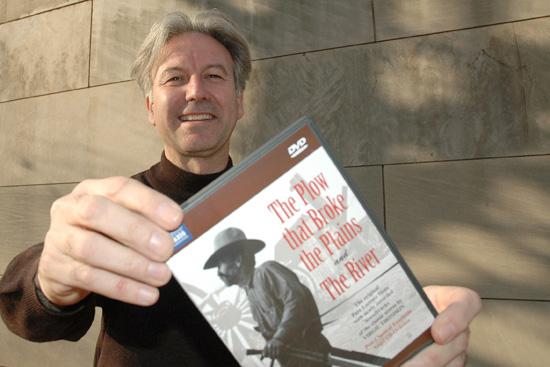Music Director’s Ensemble Provides Updated Music for Classic Documentaries
 |
| Angel Gil-Ordóñez, Wesleyan orchestra music director, directed Virgil Thomsons original soundtracks that accompany a newly-released version of The Plow that Broke the Plains and The River. |
| Posted 02/01/07 |
| Wesleyan Orchestra Music Director Angel Gil-Ordóñez addresses the impact of humanity on the environment and chronicles the settlement of the Great Plains through music on a newly-released DVD.
His Washington D.C.-based orchestra, Post-Classical Ensemble, provides the soundtrack for director Pare Lorentzs landmark New Deal-Era Classics documentaries The Plow that Broke the Plains (1936) and The River (1938). The dual-film DVD, released Jan. 30 by classical music label Naxos, features the first modern recordings of Virgil Thomsons original scores, performed by Gil-Ordóñez ‘s ensemble. Due to a small budget, the original soundtrack was recorded in one session with the poor sound-quality of the 1930s. What our effort demonstrates is that the music of Virgil Thomson is extraordinary, Gil-Ordóñez says. The documentaries can not be fully appreciated unless the music has the quality that it deserves. We re-recorded soundtrack recuperating parts of the score that were neglected in the original film, whose soundtrack besides was in very bad shape. The new restored soundtrack is already nationally-acclaimed. “The Post-Classical Ensembles new recording of Virgil Thomsons soundtrack and the fascinating supplementary materials all enhance the historic value of this wonderful DVD,” writes Paul Boyer, editor-in chief of the Oxford Companion to United States History. Both The Plow that Broke the Plains and The River are artful evocations Midwestern America in the 1930s that address the impact of humanity on its environment and the use of the media to communicate political messages. Between 1933-1937, the U.S. Government, under President Franklin D. Roosevelt, enacted the New Deal programs with a hope to help the American public recover from the Great Depression. Under the direction of the Resettlement Administration, the government sponsored several public relations campaigns involving photography, radio and film. The Resettlement Administration paid Lorentz to film both The River and The Plow That Broke the Plains, and Virgil Thomsons accompanying soundtracks rank among the composers greatest work. They set the trend in the 1930s and 1940s for a new style of film music. The River, which was filmed in 14 states, tells the story of the Tennessee Valley Authority and building dams on the Mississippi River and its tributaries. It was named to the National Film Registry in 1990 and won best documentary at the 1938 Venice Film Festival. The Plow That Broke the Plains retraced the history of the Great Plains and the abuse of the land that led to the creation of the Dust Bowl. The film, described by historian Neil Lerner as the most widely publicized attempt by the federal government to communicate to its entire citizenry through a motion picture, received denunciations as New Deal propaganda and was shunned by the commercial distribution movie system. Despite this impediment, the documentary reached people in over 3,000 theaters nationwide. In The Plow that Broke the Plains, Thomson augmented the orchestra with saxophones, guitar, banjo, and harmonium, and used cowboy songs to depict the Midwest. Gil-Ordóñez mimicked this style. Gil-Ordóñez first conducted the Post-Classical Ensemble in a live performance accompanying these two landmark documentaries at the American Film Institutes Silverdocs, an annual documentary film festival in June 2005. With support from the Center for the Arts, Gil-Ordóñez again directed the soundtracks with Wesleyan University Orchestra as a benefit for Katrina’s victims in November 2005. We spent almost one month in the studio to add the narration and the sound effects, and look for a perfect balance because I never like my own recordings, he says, smiling. Gil-Ordóñez, a native of Spain, says the DVDs release could not be more timely. The documentaries show a part of the history of this country essential to understand the present times, he explains. The River is Katrina 80 years ago. Who would have told us that Katrina would happen two months after we recorded the music. The DVD, produced with the support of the National Endowment for the Arts and the American Film Institute, is distributed in the United States by Naxos of America and can be purchased online at www.post-classicalensemble.org. I wish every young American might be exposed to these documentaries, and that some politicians might learn that with imagination and art is how you really make a difference in a society, he says. |
| By Olivia Drake, The Wesleyan Connection editor |

